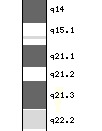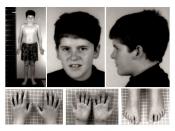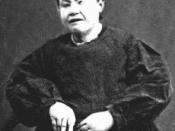Prader-Willi Syndrome
I have decided to research and explain Prader-Willi Syndrome for this paper. I will be discussing the following about the disorder; the causes, all symptoms, diagnostics, the current research. Also included, some history about how this syndrome got its name. First, Prader-Willi Syndrome is inherited from parents, and this can only happen in one way.
Prader-Willi Syndrome happens in a child because of an environmental trigger, which causes paternal chromosomal damage. There has been some research about this, and it has revealed that there "may be an association of PWS [Prader-Willi Syndrome] and fathers employed in hydrocarbon-related occupations at the time of conception (factory workers, lumbermen, machinists, chemists, heavy machine operators, mechanics)" (Website 3). In other words, the child born with PWS inherits it from his/her parents, because chromosome 15 in the father is altered by nature. Usually, it can be determined whether a child has PWS during infancy, because there are many recognizable symptoms.
Prader-Willi Syndrome has many symptoms, however some are more severe than others. The more severe of the symptoms include hypotonia and feeding difficulties in early life, followed by excessive eating and a development of thinking that they are fat and it is a bad thing. Unless externally controlled, this can turn out to be a very depressing effect. All patients have some degree of speech disorder, but it is more common for it to be a higher degree. Also, a distinctive behavioral phenotype is common. Hypogonadism, "Inadequate functioning of the testes or ovaries as manifested by deficiencies in gametogenesis or the secretion of gonadal hormones" (Website 2) is present in both males and females. And lastly, being short is common throughout many patients. Clearly, this is not a fun syndrome to inherit, and there are still more bad things about it.
Some of the less severe, less common, but still present symptoms of Prader-Willi are decreased fetal movement and early exhaustion (improving with age), behavior problems including temper tantrums, obsessive-compulsive behavior, stubbornness, rigidity, stealing, and lying. Also, unnatural sleep disturbances, small hands and feet for one's height and age, nearsightedness, thick saliva, speech articulation defects, and lastly skin picking. While these "side-effects" are not as common a the ones above, they are still found in many patients, and in a combination are giveaways of PWS in a child. But doctors do not just determine whether a person has Prader-Willi syndrome or not; there are a variety of tests that they can run.
While there are some tests that doctors and geneticists can run that are very accurate, most of diagnosis is done in DNA-based methylation testing to try to see if the paternally contributed PWS region on chromosome 15 is present. This testing works and is accurate in 99/100 patients. If this testing reveals positive, a type of Methylation testing is important to confirm the diagnosis of the syndrome, but especially those who are too young to be clinically tested. Clinical studies, which can be done on older patients follow the criteria listed below:
"Major Criteria
*Neonatal and infantile central hypotonia with poor suck and improvement with age
*Feeding problems and/or failure to thrive in infancy, with need for gavage or other special feeding techniques
*Onset of rapid weight gain between 12 months and six years of age, causing central obesity
*Hyperphagia
*Characteristic facial features: narrow bifrontal diameter, almond-shaped palpebral fissures, down-turned mouth
*Hypogonadism:
oGenital hypoplasia: small labia minora and clitoris in females; hypoplastic scrotum and cryptorchidism in males
oIncomplete and delayed puberty
oInfertility
*Developmental delay/mild to moderate mental retardation/ multiple learning disabilities
"- (from Website 1)
This type of clinical testing is proven to be even more accurate than the two other types of testing, since there is a lot of criteria to meet, and professionals looking for it. This is just one of the more current researches being done on PWS.
Dr. David Ledbetter is conducting a study, and is trying to why there is deletion in the next generation. He is seeking blood samples from 5 to 10 men that have a child with Prader-Willi syndrome. "The samples would be used for research aimed at identifying genetic mechanisms that may lead to the formation of causative deletions." (Site 4). But to better understand PWS, it would be good to look at the history of the disorder.
In the 1950s, a group of researchers, Prader, Labhart, and Willi decided to look many cases of people with the traits we now know common to PWS. In 1956 they published an article about this new syndrome, and presented it at the "8th International Paediatric Congress in Copenhagen emphasizing the most distinctive feature to be hyperphagia leading to excessive obesity" (Website 2). In later years they, and many other scientists and geneticists followed up on the research. A timeline can be found below.
"2. Prader and Willi (1963)
"Xanalyzed 14 cases and in addition to the original characteristics described:
"Xpaucity of fetal movements
"XIQ of 40-50
"Xtendency towards diabetes mellitus
3. Gablian and Royer (1968)
"Xanalyzed 11 cases and first to describe:
"Xstrabismus
"Xorthopedic problems (scoliosis, lordosis, coxa valga, hip dislocation, epiphysiolysis)
4. Zellweger and Schneider (1968)
"Xanalyzed 14 cases and identified two stages:
"X1st - infantile hypotonia
"X2nd - obesity
"Xspeculated a hypothalamic disorder as a cause
5. Hall and Smith (1972)
"Xanalyzed 32 cases and found that 100% of cases were characterized by:
"Xhypotonia
"Xgross motor developmental delay
"Xfeeding problems
"Xmale hypogenitalism
"Xobesity
"Xalso identified severe personality problems
"-(From Website 2)
As you can see, Prader-Willi Syndrome is a fairly basic syndrome, and there are a lot of resources available. Because it happens in 1/10,000 - 1/25,000 live births, PWS is a common disorder. Through all of the symptoms, testing, and clinical research, I believe that a cure for PWS is close...
Works Cited
(Website 1) http://www.geneclinics.org/profiles/pws/
(Website 2)http://www.icondata.com/health/pedbase/files/PRADER-W.HTM
(Website 3) http://www.dictionary.com/
(Website 4)http://www.pwsausa.org/research/ledbetter.htm


